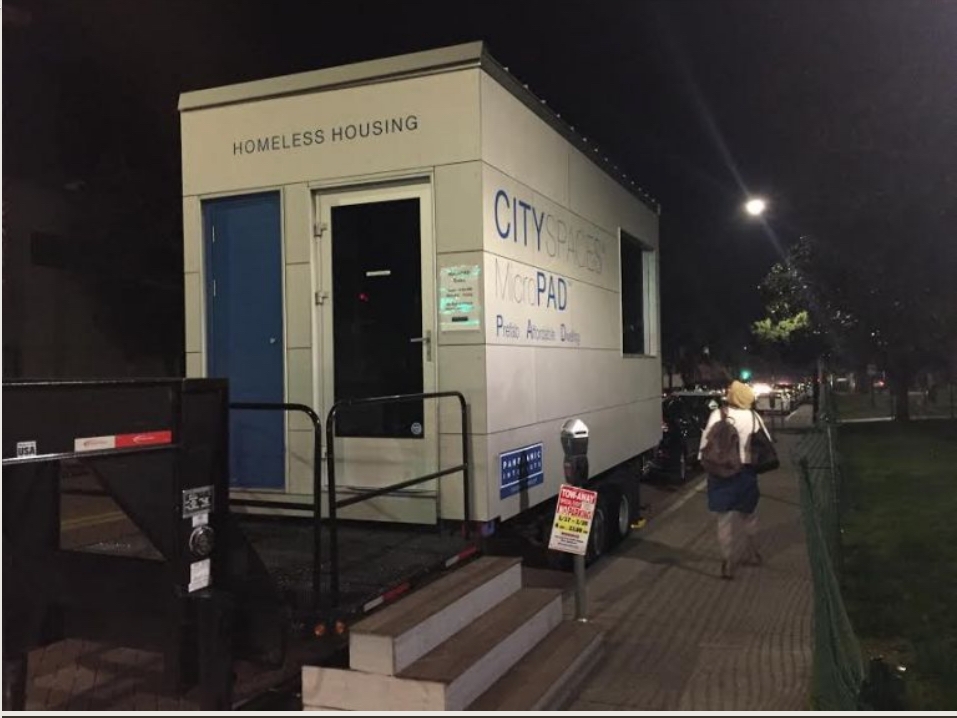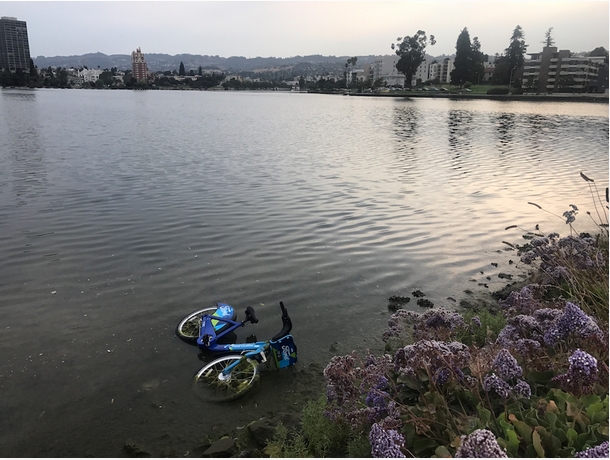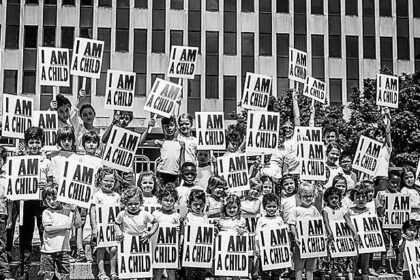Report from the Bay: Capitalization of the Commune or Monetizing Hope as Social Practice
Jeffrey Skoller
Fifty years later, he awoke one fine morning like Rip Van Winkle, and found himself again with his sea bag on his shoulder looking for anywhere he could live and work. The new owner of his old flat now wanted $4,500 a month, and many of his friends were also evicted, for it seemed their buildings weren’t owned by San Franciscans anymore, but by faceless investors with venture capital. Corporate monoculture had wiped out any unique sense of place, turning the “island city” into an artistic theme park without artists. And he was on the street.
—Lawrence Ferlingetti, The Poetic City That Was
1. The potent mix of artistic and technological experimentation, united by a counter-cultural, often anti-capitalist hope for social transformation made the Bay Area an iconic mecca for underground artists, experimental and counter-cultural living, forward-thinking inventors, and revolutionary activists during the second half of the 20th century. In the 21st century, the Bay Area has been transformed into a model neo-liberal laboratory for the monetization of the very aspiration to think differently.
2. One thinks of the brilliant ending to the Madmen TV series in which ad man Don Draper, in an attempt to rethink his life, ends up on a Bay Area hillside in a new age meditation retreat. His experience of oneness with his environment and meditative sense of presence and inner peace, seen in the smile on his face, dissolves into a vision of the future: the emergence of a new global consciousness of free-market internationalism as multi-cultural, multi-ethnic youth are standing on the California hillside holding bottles of Coca-cola singing, “I’d like to buy the world a Coke…it’s the real thing.”
3. The very notion of an enlightened vanguard community, challenging commodity culture and scandalizing staid notions of cultural production and forms of community has given way to high-salaried creatives, a generation of tekkies, and lifestyle entrepreneurs whose art is to commodify the critique of commodification. The latest Bay Area gold rush of ambitious young entrepreneurs is the phantasmagoric fulfillment of new age capitalist heroes like Stewart Brand, Steve Jobs, and other Aquarian boomers, for whom expanded consciousness and free-market entrepreneurship presented no contradiction. This 21st-century boomtown has created an environmental crisis of overcrowding, traffic, pollution, a housing crisis and wealth gap that has destroyed the very cultural ferment that was the attraction. These new age capitalist mutants have swamped the once diverse ethnic and bohemian districts of San Francisco, Berkeley, Oakland, gentrifying into oblivion the very cultures they identify with. Whole communities have been decimated. Long-time inhabitants are forced out, as landlords evict these tenants, and market prices for housing are now among the most expensive in the country. According to HUD, in 2018, “low income” status in San Francisco begins at $82,200/year for a single person, the highest in the country. For a household of three, it’s $105,700/year. In its place are the people who are profiting off of the very problems they have created.

Tim McCormick and Luke Iseman, “two Bay Area designers are re-imagining the home as a simple consumer good. If they and other entrepreneurs are successful, San Francisco’s marginal land—including parking spaces—could theoretically be retrofitted to accommodate hundreds or thousands of these barebones, movable living spaces.” At 64 square feet, McCormick’s cubic “Houslet” is designed to fit into a parking space.
—SF Public Press, June 13, 2014
Neo-liberal zealots both inside and outside of government intent on the privatization of all areas of the public sphere are exploiting the environmental and housing crises as well as the gross disparities in wealth, as tax-starved communities are turning city infrastructure—from housing and transportation to city services, public parks, and cultural institutions—over to the private sector who, in turn, use them to bolster their brand as community-minded and civically engaged corporations. Real estate developers exploit housing shortages, capitalizing on the bohemian and counter-cultural histories of neighborhoods to attract young, moneyed tech creatives, who want the authenticity of poor and ethnically diverse neighborhoods to confirm their commitment to the lifestyle of the committed artist. As they transform these communities, building upscale micro “congregate” housing, which is often rented by the single room, they use the language of communal living and intentional community, claiming them to be new and innovative forms of group living in order to get around the city’s progressive affordable housing laws for the gig economy generation. A six room flat at $1500 per room makes for quite a commune.
The YIMBY (Yes In My Backyard) and other “creative class” redevelopment groups use the language of environmentalism, such as density and walkability, as rhetoric to “greenwash” their support of and for unrestricted private development of housing, making unsubstantiated claims that market forces will build more housing, more quickly, thus alleviating housing shortages and driving down rental prices. Jacob Woocher and Shanti Singh counter:
overriding local zoning regulations and allowing for taller and denser development near transit, accelerate displacement by making it easier and more profitable for investors to build what they want in poor neighborhoods predominantly occupied by people of color, thereby pushing up prices throughout these areas, with disastrous consequences for those who rent.[1]
5. The Art of Privatizing the Urban Environmental Crisis
We are excited to announce that Lyft has reached a transformative agreement to acquire Motivate, the largest bikeshare operator in North America. Together Lyft and Motivate will revolutionize urban transportation and put bikeshare systems across the country on a path toward growth and innovation.
—John Zimmer, Lyft co-founder and president. Lyft Blog, July 2, 2018.[2]
In 1965, the Dutch anarchist group Provo invented the concept of urban bike sharing—they took old bikes, painted them white, and placed them on the streets of Amsterdam—in response to growing car congestion, rising pollution, and consumerism. Provo’s statement was, “the white bike symbolizes simplicity and hygiene as opposed to the gaudiness and filth of the authoritarian car.”[3] Over the next generation, city sponsored and supported bike-share systems took hold in European cities in Denmark, France, and Spain, later in New Zealand, Canada, and, eventually, the US. What better idea for new age entrepreneurs than to adapt an anarchist bike-share concept begun in Europe in the 1960s, appropriating their language of collective resource sharing and environmental sustainability. How to create a private, for-profit bike rental company? Sell the concept to major corporations and others wishing to attach their brand to the emerging green consumer revolution and then sell the whole thing back to tax-starved city governments desperate to find solutions to a lacking or decaying public transportation system. In return, the company receives access to public space to place their rental stations and advertising rights throughout city neighborhoods. By 2013, in major American cities, Motivate, the largest operator of bike-share rental systems in the US, has been underwritten by Ford in the Bay Area, Citi Bank in the New York metro area; in Boston and Chicago, among other cities, Blue Cross/Blue Shield is the primary sponsor.
Motivate has called their bike-share system a “transportation and advertising revolution” and claims that “Citi Bike has gone on to become perhaps the greatest advertising campaign of all time.”[4] Throughout the Bay Area, Motivate’s sponsored Ford/GoBike system has inundated neighborhoods with rental stations taking up four to eight car-length curbs. The bikes and rental stations also collect data on each renter, logging their credit cards and their travel routes. Each station also has two advertising billboards, and the bikes themselves serve as mobile advertising, each emblazoned with the Ford logo. In addition to having their personal data collected, bike renters then pay Ford to do the work of driving these rolling advertisements through city streets. As of 2018, Ford/GoBike has 7,000 bikes moving through the Bay Area with 540 rental stations, each taking up 4 to 8 car lengths of public curb and sidewalk space. Ford also operates nearly 100 Transit shuttles along 28 routes throughout the San Francisco Bay Area. According to Ford, it “plans to develop technologies to use data collected from the bikes to build an interconnected mobility network.”[5]

We, the undersigned residents of the 3000 block of Fulton Street in the City of Berkeley, demand that Ford/GoBike remove the bike rack they have unilaterally installed on Fulton Street….
On March 29, residents of Fulton Street in South Berkeley awoke to find that the southwestern corner of their block had become a tow-away zone for the installation of a Ford/GoBike rental station. When confronted by incredulous block residents, Ford/Motivate representatives claimed they had contacted every unit on the block through fliers and door-knocking, and all were given the opportunity to raise questions and express their opinions before the installation was approved. Residents all down the block sharply disputed the claim that everyone had been contacted and said they had heard nothing about the bike rack until the day it was installed. Motivate’s head of external affairs admitted that they had lied about the extensiveness of their canvassing. Only the apartment building directly in front of the rental station was informed. Thus, block residents called on their neighborhood councilman and Berkeley city transportation officials to meet to discuss the station and its removal.
At the meeting, over sixty residents expressed anger and disappointment with the City of Berkeley for ceding its authority to Motivate, an external, for-profit bike rental company, to build and run the system in the city. Residents charged that the City had been derelict in its fundamental duty to consult with the community and represent its interests. People at the meeting made clear that they would prefer to see the possibility of a city-owned and -funded, true bike-share program researched and discussed in ways that might eventually lead to a vote by Berkeley citizens. City officials defended their decision by saying the city could not afford to finance and run such a program, and that giving Motivate free access to public space and allowing corporate advertising throughout the city was a small price to pay for a complete bike rental system. What was extraordinary was how deeply the residents understood the perils of turning over their community to such public/private partnerships.
7. Commercial Advertising and Community character
Greenwashing:
Residents strongly objected to the intrusion of commercial advertising onto residential streets, seeing it as a fundamental violation of the unique character of the neighborhood and the city. How could the City of Berkeley allow Ford Motors to greenwash their polluting and climate-imperiling brand on residential streets by installing billboards and bike frames that feature their logos. The City acknowledged that, in fact, as part of contractual agreements neighborhood advertising restrictions were lifted to allow Ford/Motivate to advertise freely on residential blocks. Motivate has also begun to sell advertising to other companies, as ads from Alaska Airlines and Rail Europe have been spotted on Ford/GoBike billboards.
Who is this bike rental system for?
Residents asked who is the Ford/GoBike rental system for? The entire GoBike system is geared towards those who can afford to rent the bikes, those who are of the proper age and economic status to have credit cards and smartphones. Those who qualify as low income can join for $5 for the first year with a 60-minute ride per day. Those under 18 are not allowed to rent Ford/GoBikes, thus making it useless for teenagers who are often the largest group of bike riders. Elderly and disabled residents objected to the rental stations as they had no use for the bikes and as the rental station took up limited parking spaces they needed for the cars that give them mobility.
Meeting Outcome:
After hearing community sentiment, Councilman Bartlett agreed that the station should be moved from the Fulton Street block, and he committed to working with the City to that end. He also said he would raise the possibility of buying out the advertising component of the program with his colleagues on the City Council. The Berkeley transportation officials agreed that they would work with the Council Member to achieve these ends. On May 10, Councilman Bartlett announced that the City agreed to remove the Ford/GoBike rental station. As of July 15, the station still has not been removed.
8.
Instead of fixing the old trains, let’s rip out the tracks and fill the tunnels with fleets of autonomous vehicles running on pavement…installing such a system would have side effects that would make them worth every penny. Rats, after all, hate the light and would be pushed to find new underground homes…[6]
—Peter Wayner, “The New York City Subway Is Beyond Repair,”The Atlantic, June 9, 2018.
On July 2, 2018, Lyft Car Share Company announced that it was acquiring the Motivate Company for a reported 250 million dollars. With this, Lyft, along with Uber, acquired another bike-share start-up company called Jump, in a deal valued at over 100 million dollars. These transportation corporations are expecting revenues in the billions of dollars as the private sector restructures the urban mass-transportation market in its own profit seeking interests, moving from automobile ride hailing, which destroyed the taxi cab industry, to bicycle and motorized scooter rentals.[7]
In the larger scheme of the global horrors of 2018, the critique of the development of private urban bicycle rental companies can seem trivial. But it is an important example of the insidious and even transparent way the localization of the corporate privatization overtakes our communities and culture. What is at once horrifying, humorously ironic, and intensely creative is the way that a new generation of highly educated creatives and socially concerned entrepreneurs have found a way to profit from the crises of the neo-liberal culture that has consumed our cities over the last forty years. To do this, they have, without irony or self-consciousness, commandeered, appropriated, and monetized the very language and concepts that have defined progressive politics, counter-cultural social forms, and creative thinking in the Bay Area over the last fifty years. This too is the creative art of social practice.
Jeffrey Skoller is a writer and filmmaker. His films, video and photography have been
exhibited internationally. Screenings and exhibitions include: The Pacific Film Archive,
Berkeley; Museum of the Moving Image, NY; JP Getty Museum, Los Angeles, CA,
Whitney Museum, NY; P.S. 1, NY; Yerba Buena Center for the Arts; Flaherty Film
Seminar, NY; Arsenal Kino, Berlin; Mannheim Film Festival, Germany; The Latin
American Film Festival, Havana; National Film Theatre, London. His essays and articles
on experimental film and video have appeared in numerous books, artist catalogues and
in journals including Film Quarterly; Discourse; Representations; Afterimage;
Animation: An Interdisciplinary Journal, World Records,Cinematograph, among others.
He is the author of two books Shadows, Specters, Shards: Making History in Avant-
Garde Film (University of Minnesota Press) and POSTWAR: The Films of Daniel
Eisenberg (Blackdog Press). Skoller currently teaches in the Dept of Film & Media at UC Berkeley.
Endnotes
[1] Jacob Woocher and Shanti Singh, “The Market Will Not Fix California’s Housing Crisis,” Dissent, March 29, 2018. https://www.dissentmagazine.org/blog/market-will-not-fix-california-housing-crisis-sb-827-yimby-left-response
[2] https://blog.lyft.com/posts/lyft-to-acquire-us-bikeshare-leader
[3] Renate van der Zee, “Story of cities #30: how this Amsterdam inventor gave bike-sharing to the world,” The Guardian, April 26, 2016. https://www.theguardian.com/cities/2016/apr/26/story-cities-amsterdam-bike-share-scheme
[4] Motivate Website. https://www.motivateco.com/in-the-news-fast-company-on-how-citi-bike-started-an-advertising-transportation-revolution/
[5] See Ford media Center article: “Ford Partnering with Global Cities on New Transportation; Chariot Shuttle to Be Acquired, Ford GoBike to Launch in San Francisco,” September 9, 2016. https://media.ford.com/content/fordmedia/fna/us/en/news/2016/09/09/ford-partnering-with-global-cities-on-new-transportation–chario.html
[6] Peter Wayner, “The New York City Subway Is Beyond Repair,” The Atlantic, June 9, 2018. https://www.theatlantic.com/technology/archive/2018/06/the-new-york-city-subway-is-beyond-repair/562472/
[7] Patrick Sisson, “Lyft to Purchase Leading Bike Share Operator,” Curbed, July 2, 2018. https://www.curbed.com/2018/6/1/17417766/lyft-bikeshare-motivate-urban-transportation-citi-bike










